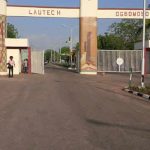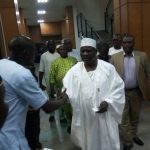The presidency on Tuesday declared that the ongoing probe of the acting EFCC Chairman, is an affirmation that nobody under the present administration is above scrutiny.
According to facts made available to State House correspondents by an anonymous presidency source in Abuja on Tuesday, the interrogation of the anti-graft boss is to give him the opportunity to clear himself.
The 58-year-old senior police officer was appointed to head the anti-graft agency on the 9th of November, 2015 to replace his former colleague in the police and the EFCC, Ibrahim Lamorde who was sacked by President Buhari in his first few months in office.
In July, 2016, the President requested the confirmation of Mr. Magu’s appointment by the Senate.
Six months after, on the 15th of December, the senate rejected the nomination and turned down the confirmation.
The ground was a certain security report by the DSS, another agency under the same authority of the President.
In March, 2017, the senate again refused to confirm Mr. Magu’s appointment and the reason is still the security report from the DSS, freshly presented a day before the sitting.
Section two, subsection three of the EFCC Act, 2014, provides that the President alone has the power to appoint who sits as the Chairman of the commission.
Then, section 11 of the interpretation act cap 123 of the laws of the federation of Nigeria, allow the President to appoint and reappoint an individual ‘as it is considered expedient,’ as the appointing authority.
Having survived every attempt to remove him and enjoying the support of the President, Mr. Magu remained in office for four years and eight months in acting capacity.
But the last stroke that seem to have broken the camel’s back came from another part of the presidency and in fact the supervising authority to the EFCC.
The Attorney general and minister of justice, Abubakar Malami, in June, wrote to the president demanding the removal of Mr. Magu from office.
He accused him of insubordination, diversion of recovered loot, accounting discrepancies and other misconducts.
Now whether Mister Magu survives this again or not, there are valid questions demanding urgent answers.
1. Is the President satisfied about Mr. Magu’s capacity and his performance as head of the commission?
2. Is it strategic that agencies and arms of the same presidency come at each other’s neck from time to time?
3. How does the storm in the country’s anti-corruption driver present the government’s claim of being serious with wiping away the menace from the country?
The presidency on Tuesday declared that the ongoing probe of the acting EFCC Chairman, is an affirmation that nobody under the present administration is above scrutiny.
According to facts made available to State House correspondents by an anonymous presidency source in Abuja on Tuesday, the interrogation of the anti-graft boss is to give him the opportunity to clear himself.
The 58-year-old senior police officer was appointed to head the anti-graft agency on the 9th of November, 2015 to replace his former colleague in the police and the EFCC, Ibrahim Lamorde who was sacked by President Buhari in his first few months in office.
In July, 2016, the President requested the confirmation of Mr. Magu’s appointment by the Senate.
Six months after, on the 15th of December, the senate rejected the nomination and turned down the confirmation.
The ground was a certain security report by the DSS, another agency under the same authority of the President.
In March, 2017, the senate again refused to confirm Mr. Magu’s appointment and the reason is still the security report from the DSS, freshly presented a day before the sitting.
Section two, subsection three of the EFCC Act, 2014, provides that the President alone has the power to appoint who sits as the Chairman of the commission.
Then, section 11 of the interpretation act cap 123 of the laws of the federation of Nigeria, allow the President to appoint and reappoint an individual ‘as it is considered expedient,’ as the appointing authority.
Having survived every attempt to remove him and enjoying the support of the President, Mr. Magu remained in office for four years and eight months in acting capacity.
But the last stroke that seem to have broken the camel’s back came from another part of the presidency and in fact the supervising authority to the EFCC.
The Attorney general and minister of justice, Abubakar Malami, in June, wrote to the president demanding the removal of Mr. Magu from office.
He accused him of insubordination, diversion of recovered loot, accounting discrepancies and other misconducts.
Now whether Mister Magu survives this again or not, there are valid questions demanding urgent answers.
1. Is the President satisfied about Mr. Magu’s capacity and his performance as head of the commission?
2. Is it strategic that agencies and arms of the same presidency come at each other’s neck from time to time?
3. How does the storm in the country’s anti-corruption driver present the government’s claim of being serious with wiping away the menace from the country?
The presidency on Tuesday declared that the ongoing probe of the acting EFCC Chairman, is an affirmation that nobody under the present administration is above scrutiny.
According to facts made available to State House correspondents by an anonymous presidency source in Abuja on Tuesday, the interrogation of the anti-graft boss is to give him the opportunity to clear himself.
The 58-year-old senior police officer was appointed to head the anti-graft agency on the 9th of November, 2015 to replace his former colleague in the police and the EFCC, Ibrahim Lamorde who was sacked by President Buhari in his first few months in office.
In July, 2016, the President requested the confirmation of Mr. Magu’s appointment by the Senate.
Six months after, on the 15th of December, the senate rejected the nomination and turned down the confirmation.
The ground was a certain security report by the DSS, another agency under the same authority of the President.
In March, 2017, the senate again refused to confirm Mr. Magu’s appointment and the reason is still the security report from the DSS, freshly presented a day before the sitting.
Section two, subsection three of the EFCC Act, 2014, provides that the President alone has the power to appoint who sits as the Chairman of the commission.
Then, section 11 of the interpretation act cap 123 of the laws of the federation of Nigeria, allow the President to appoint and reappoint an individual ‘as it is considered expedient,’ as the appointing authority.
Having survived every attempt to remove him and enjoying the support of the President, Mr. Magu remained in office for four years and eight months in acting capacity.
But the last stroke that seem to have broken the camel’s back came from another part of the presidency and in fact the supervising authority to the EFCC.
The Attorney general and minister of justice, Abubakar Malami, in June, wrote to the president demanding the removal of Mr. Magu from office.
He accused him of insubordination, diversion of recovered loot, accounting discrepancies and other misconducts.
Now whether Mister Magu survives this again or not, there are valid questions demanding urgent answers.
1. Is the President satisfied about Mr. Magu’s capacity and his performance as head of the commission?
2. Is it strategic that agencies and arms of the same presidency come at each other’s neck from time to time?
3. How does the storm in the country’s anti-corruption driver present the government’s claim of being serious with wiping away the menace from the country?
The presidency on Tuesday declared that the ongoing probe of the acting EFCC Chairman, is an affirmation that nobody under the present administration is above scrutiny.
According to facts made available to State House correspondents by an anonymous presidency source in Abuja on Tuesday, the interrogation of the anti-graft boss is to give him the opportunity to clear himself.
The 58-year-old senior police officer was appointed to head the anti-graft agency on the 9th of November, 2015 to replace his former colleague in the police and the EFCC, Ibrahim Lamorde who was sacked by President Buhari in his first few months in office.
In July, 2016, the President requested the confirmation of Mr. Magu’s appointment by the Senate.
Six months after, on the 15th of December, the senate rejected the nomination and turned down the confirmation.
The ground was a certain security report by the DSS, another agency under the same authority of the President.
In March, 2017, the senate again refused to confirm Mr. Magu’s appointment and the reason is still the security report from the DSS, freshly presented a day before the sitting.
Section two, subsection three of the EFCC Act, 2014, provides that the President alone has the power to appoint who sits as the Chairman of the commission.
Then, section 11 of the interpretation act cap 123 of the laws of the federation of Nigeria, allow the President to appoint and reappoint an individual ‘as it is considered expedient,’ as the appointing authority.
Having survived every attempt to remove him and enjoying the support of the President, Mr. Magu remained in office for four years and eight months in acting capacity.
But the last stroke that seem to have broken the camel’s back came from another part of the presidency and in fact the supervising authority to the EFCC.
The Attorney general and minister of justice, Abubakar Malami, in June, wrote to the president demanding the removal of Mr. Magu from office.
He accused him of insubordination, diversion of recovered loot, accounting discrepancies and other misconducts.
Now whether Mister Magu survives this again or not, there are valid questions demanding urgent answers.
1. Is the President satisfied about Mr. Magu’s capacity and his performance as head of the commission?
2. Is it strategic that agencies and arms of the same presidency come at each other’s neck from time to time?
3. How does the storm in the country’s anti-corruption driver present the government’s claim of being serious with wiping away the menace from the country?
The presidency on Tuesday declared that the ongoing probe of the acting EFCC Chairman, is an affirmation that nobody under the present administration is above scrutiny.
According to facts made available to State House correspondents by an anonymous presidency source in Abuja on Tuesday, the interrogation of the anti-graft boss is to give him the opportunity to clear himself.
The 58-year-old senior police officer was appointed to head the anti-graft agency on the 9th of November, 2015 to replace his former colleague in the police and the EFCC, Ibrahim Lamorde who was sacked by President Buhari in his first few months in office.
In July, 2016, the President requested the confirmation of Mr. Magu’s appointment by the Senate.
Six months after, on the 15th of December, the senate rejected the nomination and turned down the confirmation.
The ground was a certain security report by the DSS, another agency under the same authority of the President.
In March, 2017, the senate again refused to confirm Mr. Magu’s appointment and the reason is still the security report from the DSS, freshly presented a day before the sitting.
Section two, subsection three of the EFCC Act, 2014, provides that the President alone has the power to appoint who sits as the Chairman of the commission.
Then, section 11 of the interpretation act cap 123 of the laws of the federation of Nigeria, allow the President to appoint and reappoint an individual ‘as it is considered expedient,’ as the appointing authority.
Having survived every attempt to remove him and enjoying the support of the President, Mr. Magu remained in office for four years and eight months in acting capacity.
But the last stroke that seem to have broken the camel’s back came from another part of the presidency and in fact the supervising authority to the EFCC.
The Attorney general and minister of justice, Abubakar Malami, in June, wrote to the president demanding the removal of Mr. Magu from office.
He accused him of insubordination, diversion of recovered loot, accounting discrepancies and other misconducts.
Now whether Mister Magu survives this again or not, there are valid questions demanding urgent answers.
1. Is the President satisfied about Mr. Magu’s capacity and his performance as head of the commission?
2. Is it strategic that agencies and arms of the same presidency come at each other’s neck from time to time?
3. How does the storm in the country’s anti-corruption driver present the government’s claim of being serious with wiping away the menace from the country?
The presidency on Tuesday declared that the ongoing probe of the acting EFCC Chairman, is an affirmation that nobody under the present administration is above scrutiny.
According to facts made available to State House correspondents by an anonymous presidency source in Abuja on Tuesday, the interrogation of the anti-graft boss is to give him the opportunity to clear himself.
The 58-year-old senior police officer was appointed to head the anti-graft agency on the 9th of November, 2015 to replace his former colleague in the police and the EFCC, Ibrahim Lamorde who was sacked by President Buhari in his first few months in office.
In July, 2016, the President requested the confirmation of Mr. Magu’s appointment by the Senate.
Six months after, on the 15th of December, the senate rejected the nomination and turned down the confirmation.
The ground was a certain security report by the DSS, another agency under the same authority of the President.
In March, 2017, the senate again refused to confirm Mr. Magu’s appointment and the reason is still the security report from the DSS, freshly presented a day before the sitting.
Section two, subsection three of the EFCC Act, 2014, provides that the President alone has the power to appoint who sits as the Chairman of the commission.
Then, section 11 of the interpretation act cap 123 of the laws of the federation of Nigeria, allow the President to appoint and reappoint an individual ‘as it is considered expedient,’ as the appointing authority.
Having survived every attempt to remove him and enjoying the support of the President, Mr. Magu remained in office for four years and eight months in acting capacity.
But the last stroke that seem to have broken the camel’s back came from another part of the presidency and in fact the supervising authority to the EFCC.
The Attorney general and minister of justice, Abubakar Malami, in June, wrote to the president demanding the removal of Mr. Magu from office.
He accused him of insubordination, diversion of recovered loot, accounting discrepancies and other misconducts.
Now whether Mister Magu survives this again or not, there are valid questions demanding urgent answers.
1. Is the President satisfied about Mr. Magu’s capacity and his performance as head of the commission?
2. Is it strategic that agencies and arms of the same presidency come at each other’s neck from time to time?
3. How does the storm in the country’s anti-corruption driver present the government’s claim of being serious with wiping away the menace from the country?
The presidency on Tuesday declared that the ongoing probe of the acting EFCC Chairman, is an affirmation that nobody under the present administration is above scrutiny.
According to facts made available to State House correspondents by an anonymous presidency source in Abuja on Tuesday, the interrogation of the anti-graft boss is to give him the opportunity to clear himself.
The 58-year-old senior police officer was appointed to head the anti-graft agency on the 9th of November, 2015 to replace his former colleague in the police and the EFCC, Ibrahim Lamorde who was sacked by President Buhari in his first few months in office.
In July, 2016, the President requested the confirmation of Mr. Magu’s appointment by the Senate.
Six months after, on the 15th of December, the senate rejected the nomination and turned down the confirmation.
The ground was a certain security report by the DSS, another agency under the same authority of the President.
In March, 2017, the senate again refused to confirm Mr. Magu’s appointment and the reason is still the security report from the DSS, freshly presented a day before the sitting.
Section two, subsection three of the EFCC Act, 2014, provides that the President alone has the power to appoint who sits as the Chairman of the commission.
Then, section 11 of the interpretation act cap 123 of the laws of the federation of Nigeria, allow the President to appoint and reappoint an individual ‘as it is considered expedient,’ as the appointing authority.
Having survived every attempt to remove him and enjoying the support of the President, Mr. Magu remained in office for four years and eight months in acting capacity.
But the last stroke that seem to have broken the camel’s back came from another part of the presidency and in fact the supervising authority to the EFCC.
The Attorney general and minister of justice, Abubakar Malami, in June, wrote to the president demanding the removal of Mr. Magu from office.
He accused him of insubordination, diversion of recovered loot, accounting discrepancies and other misconducts.
Now whether Mister Magu survives this again or not, there are valid questions demanding urgent answers.
1. Is the President satisfied about Mr. Magu’s capacity and his performance as head of the commission?
2. Is it strategic that agencies and arms of the same presidency come at each other’s neck from time to time?
3. How does the storm in the country’s anti-corruption driver present the government’s claim of being serious with wiping away the menace from the country?
The presidency on Tuesday declared that the ongoing probe of the acting EFCC Chairman, is an affirmation that nobody under the present administration is above scrutiny.
According to facts made available to State House correspondents by an anonymous presidency source in Abuja on Tuesday, the interrogation of the anti-graft boss is to give him the opportunity to clear himself.
The 58-year-old senior police officer was appointed to head the anti-graft agency on the 9th of November, 2015 to replace his former colleague in the police and the EFCC, Ibrahim Lamorde who was sacked by President Buhari in his first few months in office.
In July, 2016, the President requested the confirmation of Mr. Magu’s appointment by the Senate.
Six months after, on the 15th of December, the senate rejected the nomination and turned down the confirmation.
The ground was a certain security report by the DSS, another agency under the same authority of the President.
In March, 2017, the senate again refused to confirm Mr. Magu’s appointment and the reason is still the security report from the DSS, freshly presented a day before the sitting.
Section two, subsection three of the EFCC Act, 2014, provides that the President alone has the power to appoint who sits as the Chairman of the commission.
Then, section 11 of the interpretation act cap 123 of the laws of the federation of Nigeria, allow the President to appoint and reappoint an individual ‘as it is considered expedient,’ as the appointing authority.
Having survived every attempt to remove him and enjoying the support of the President, Mr. Magu remained in office for four years and eight months in acting capacity.
But the last stroke that seem to have broken the camel’s back came from another part of the presidency and in fact the supervising authority to the EFCC.
The Attorney general and minister of justice, Abubakar Malami, in June, wrote to the president demanding the removal of Mr. Magu from office.
He accused him of insubordination, diversion of recovered loot, accounting discrepancies and other misconducts.
Now whether Mister Magu survives this again or not, there are valid questions demanding urgent answers.
1. Is the President satisfied about Mr. Magu’s capacity and his performance as head of the commission?
2. Is it strategic that agencies and arms of the same presidency come at each other’s neck from time to time?
3. How does the storm in the country’s anti-corruption driver present the government’s claim of being serious with wiping away the menace from the country?














